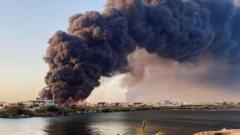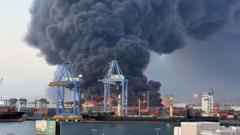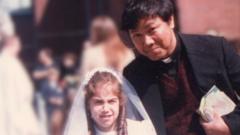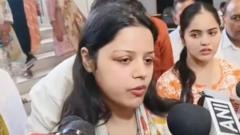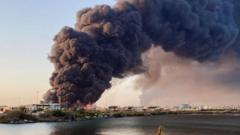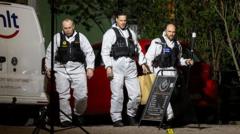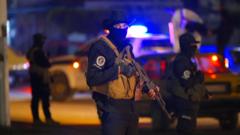The newly-formed Syrian Identification Centre embarks on a painstaking journey to identify victims from mass graves, highlighting the struggles faced by families still grappling with loss and uncertainty in the aftermath of the war.
Uncovering the Truth: The Long Path to Justice for Syria's Missing

Uncovering the Truth: The Long Path to Justice for Syria's Missing
Medics in Syria face a daunting challenge as they work to identify remains from mass graves, a task that reveals the brutal legacy of the civil war.
In the wake of a devastating 13-year civil war, the Syrian Identification Centre opens its doors in Damascus, tasked with the enormous responsibility of identifying remains from mass graves scattered throughout the country. Dr. Anas al-Hourani, at the helm of this center, explains the chilling process: the bodies found in these "mixed mass graves" often lie atop one another, the remains of hundreds of thousands believed to have been slain under the regimes of Bashar al-Assad and his father, Hafez. Recent victims, Dr. al-Hourani presumes, perished within the last year.
The forensic odontologist places particular emphasis on the significance of teeth for identification, noting that while DNA analysis is the gold standard, challenges abound. Syria's sole DNA testing center was severely damaged during the war, and sanctions hinder the availability of essential chemicals and equipment for DNA testing. The financial burden is considerable, with each test costing around $250—an exorbitant sum for a country still grappling with the aftermath of conflict.
As a result, the International Committee of the Red Cross is the centre's only source of funding, leaving many families in a perpetual state of helplessness. A glaring reality remains: while the new government of Islamist rebels claims to prioritize "transitional justice," displaced Syrians express frustration at the perceived lack of urgency in addressing their loved ones' fates.
In a poignant reminder of the war's brutality, the BBC team visits several mixed mass grave sites on a desolate hilltop. Journalist Mouaz Mustafa introduces them to Abu Ali, a former Syrian military driver who recounts harrowing tales of transporting lorry-loads of bodies—civilians who were often tortured and marked only by identification numbers. His mundane routine of hauling corpses from military sites to hastily dug graves speaks volumes about the state of humanity during this bleak period.
Those seeking closure include Malak Aoude, a mother recently returned from exile in Turkey, whose sons were disappeared years ago under Assad's regime. In a heart-wrenching search for answers, she hopes to glean information about her younger son, Maher, who vanished in 2012. Despite a dogged search and a recently uncovered school ledger that alludes to her son's absence, Malak's anguish remains unresolved. As the newly-formed government touts freedom, families like hers are left contemplating the painful legacy of a war that continues to haunt them.
Abu Ali, too, reflects on his past as a mere cog in the military machine, resigned to his fate as a "mute servant of the state." While the new Syrian landscape may hold promise, the task of identifying victims and providing justice remains monumental, a sobering reality for a nation still mired in grief and yearning for truth amidst pain.






